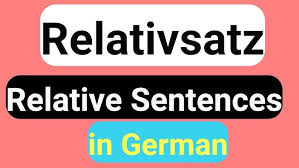
Relativsatz gives extra Information about the noun or pronoun. It joins the two sentences basically. There are certain rules that we need to keep in mind. Here you learn how to make relative.sentences in germana in different cases namely; nominative, accusative and dative.
1. Verb position is last.
2. We use definite articles while making relativsatz. Ex: der, die, das, den etc.
3. It joins two sentences.
4. Relativsatz gives extra information about the noun/pronoun.
What is example of relativsatz (relative clause)
• This is ram, who lives in Hamburg.
• Das ist ram, der in Hamburg wohnt.
• My neighbour, who is very reich, works with DHL.
• Mein Nachbar, der sehr reich ist, arbeitet bei DHL.
So,here you see ‘who’ is a relative pronoun in English and it refers back to ram (Proper noun). Who, which, that, whom etc are relative pronouns in english.
The child, who is playing in garten…… (Nominative)
The woman, whom I saw in the market…… (Accusative)
The boy, who called me yesterday…… (Nominative)
Relativsatz in German Nominativ
Relativsatz in German Accusative
Relativesatz in German Dative
Relativpronomen in German table
other links